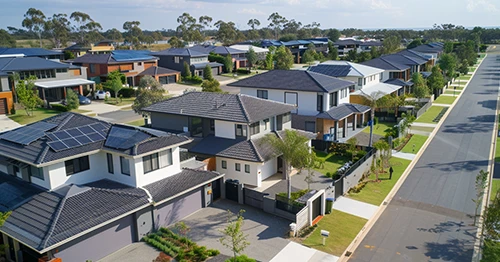Updated: 27 Feb, 2025
Table of Contents
- How do banks assess US citizens looking for a home loan?
- How does a typical loan application work?
- Australian mortgages versus US mortgages
- What type of visa do I need for a mortgage in Australia?
- Do US residents need to apply for Australian Government approval?
- Are US citizens eligible for the First Home Owners Grant (FHOG)?
- How much can you borrow?
- Apply for an Australian mortgage today!
Contrary to popular belief, there are Americans that actually know where Australia is!
In fact, each year, thousands of US citizens migrate Down Under to become expats to holiday and work, and some even end up buying their very own slice of the Australian dream.
A large number of US migrants have even recognised our robust real estate market and want to tap into the property investment opportunities available. The question is, can US expats qualify for a mortgage in Australia?
How do banks assess US citizens looking for a home loan?
US citizens and permanent residents are treated exactly the same as foreign citizens or temporary residents of Australia. This remains true unless you are a spouse of an Australian citizen or permanent resident and you’re buying a property to live in together.
Foreigners investing in Australia may need to apply for government approval. It doesn’t mean you can’t purchase residential or investment property, but there are restrictions for temporary residents looking to live in Australia.
How does a typical loan application work?
In Australia, the loan application process can be fairly simple. A good first step is to contact a mortgage broker that specialises in expat home loans and can match you with the right loan and lender for your situation.
As part of the preliminary assessment, the broker will ask you to provide specific documents to verify your identity, income and your eligibility for a housing loan.
They will then apply with the bank they believe is most likely to approve your loan.
The best part is that all of the leg work undertaken by the broker is absolutely free for most loan types. The reason is that the broker is paid by the banks for introducing new loans.
You can also apply directly to a bank or lender although this can severely limit your options and chance of approval since a bank will only offer you its own products and services. A mortgage broker can compare through many different lending institutions to find the best loan and the most competitive interest rate.
Get in touch with one of our specialist mortgage brokers to learn more about Australian mortgages. Call 1300 889 743 (when outside Australia call +61 2 9194 1700) or complete our free assessment form today.
All the properties you should avoid and the ones you should go for - explained by Experts. Take our detailed Home Buyers Program to not miss out on some great tips.
SIGN UP FOR FREEAustralian mortgages versus US mortgages
In the United States, the loan application is submitted to an underwriter which is, in most cases, the bank. Sometimes borrowers also go through a third party, such as a mortgage broker. They will look at a number of different banks and lenders on your behalf.
Up to this point, the process is fairly similar to that in Australia.
Unlike Australian though, US laws regarding financial products differ from state to state. This can potentially change the process because the laws and protections that apply to you will vary depending on where you live.
What type of visa do I need for a mortgage in Australia?
When applying for an Australian mortgage there are many types of visa subclasses accepted by banks and lenders including business visas like the 457 temporary business (long stay) visa.
Skilled workers looking to migrate to Australia can apply through the Australian Government’s skilled migration service called SkillSelect. Basically, it enables an easier transition to Australia for overseas workers with skills in high demand.
Do US residents need to apply for Australian Government approval?
Citizens of the United States need to apply for approval from the Foreign Investment Review Board (FIRB). This Australian Government body determines the level of foreign investment within Australia, including property investment.
Are US citizens eligible for the First Home Owners Grant (FHOG)?
Unfortunately, temporary resident or foreign citizen are not eligible to apply for the First Home Owners Grant (FHOG). However, if you purchase the property with an Australian citizen or permanent resident, you may qualify for the FHOG as long as you are:
- Their partner or spouse AND
- Buying the property together legally as joint tenants (as opposed to tenants in common).
How much can you borrow?
US citizens may be able to borrow up to 95% of the value of the property (95% LVR) under certain conditions, when applying for an Australian mortgage but you’re usually restricted to a maximum of 90% LVR (known as LTV in the US).
Foreign investors are usually able to borrow only up to 70% or 80% of the property value.
Please bear in mind that if you borrow above 80% LVR you may need to pay lenders mortgage insurance (LMI). This protects the bank against a borrower defaulting on their monthly repayments.
It is also useful to know that variable interest rates are chosen by over 80% of borrowers in Australia, unlike the US where fixed rates are preferred. This is similar to the Adjustable-Rate Mortgage (ARM) available from US financial institutions.
Apply for an Australian mortgage today!
At the Home Loan Experts we specialise in mortgages for non-residents and temporary residents of Australia. We work with over 40 different lenders, which increases your chance of approval for a great loan with a competitive interest rate.
Please call one of our experienced mortgage brokers on 1300 889 743 (when outside Australia call +61 2 9194 1700), or fill in our free assessment form so we can assess your situation.
Are you thinking about investing in Australian real estate?
Have a read of our buyers guide. It will help you understand what professionals you may need to consult and provide you with a guide on the buying process itself.





